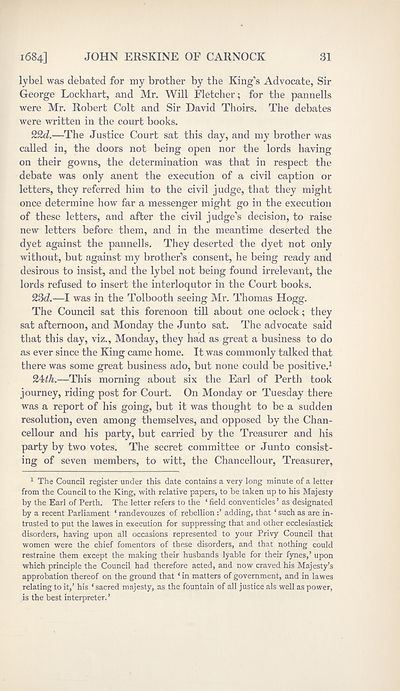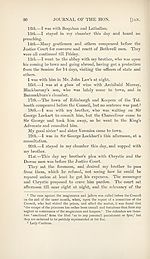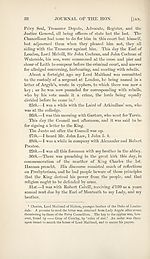Series 1 > Journal of the Hon. John Erskine of Carnock, 1683-1687
(86) Page 31
Download files
Complete book:
Individual page:
Thumbnail gallery: Grid view | List view

1684]
JOHN ERSKINE OF CARNOCK
31
lybel was debated for my brother by the King’s Advocate, Sir
George Lockhart, and Mr. Will Fletcher; for the pannells
were Mr. Robert Colt and Sir David Thoirs. The debates
were written in the court books.
22d.—The Justice Court sat this day, and my brother was
called in, the doors not being open nor the lords having
on their gowns, the determination was that in respect the
debate was only anent the execution of a civil caption or
letters, they referred him to the civil judge, that they might
once determine how far a messenger might go in the execution
of these letters, and after the civil judge’s decision, to raise
new letters before them, and in the meantime deserted the
dyet against the pannells. They deserted the dyet not only
without, but against my brother’s consent, he being ready and
desirous to insist, and the lybel not being found irrelevant, the
lords refused to insert the interloqutor in the Court books.
23d.—I was in the Tolbooth seeing Mr. Thomas Hogg.
The Council sat this forenoon till about one oclock; they
sat afternoon, and Monday the Junto sat. The advocate said
that this day, viz., Monday, they had as great a business to do
as ever since the King came home. It was commonly talked that
there was some great business ado, but none could be positive.1
—This morning about six the Earl of Perth took
journey, riding post for Court. On Monday or Tuesday there
was a report of his going, but it was thought to be a sudden
resolution, even among themselves, and opposed by the Chan-
cellour and his party, but carried by the Treasurer and his
party by two votes. The secret committee or Junto consist¬
ing of seven members, to witt, the Chancellour, Treasurer,
1 The Council register under this date contains a very long minute of a letter
from the Council to the King, with relative papers, to be taken up to his Majesty
by the Earl of Perth. The letter refers to the ‘ field conventicles ’ as designated
by a recent Parliament ‘ randevouzes of rebellion adding, that ‘ such as are in¬
trusted to put the lawes in execution for suppressing that and other ecclesiastick
disorders, having upon all occasions represented to your Privy Council that
women were the chief fomentors of these disorders, and that nothing could
restraine them except the making their husbands lyable for their fynes,’ upon
which principle the Council had therefore acted, and now craved his Majesty’s
approbation thereof on the ground that ‘ in matters of government, and in lawes
relating to it,’ his ‘ sacred majesty, as the fountain of all justice als well as power,
is the best interpreter. ’
JOHN ERSKINE OF CARNOCK
31
lybel was debated for my brother by the King’s Advocate, Sir
George Lockhart, and Mr. Will Fletcher; for the pannells
were Mr. Robert Colt and Sir David Thoirs. The debates
were written in the court books.
22d.—The Justice Court sat this day, and my brother was
called in, the doors not being open nor the lords having
on their gowns, the determination was that in respect the
debate was only anent the execution of a civil caption or
letters, they referred him to the civil judge, that they might
once determine how far a messenger might go in the execution
of these letters, and after the civil judge’s decision, to raise
new letters before them, and in the meantime deserted the
dyet against the pannells. They deserted the dyet not only
without, but against my brother’s consent, he being ready and
desirous to insist, and the lybel not being found irrelevant, the
lords refused to insert the interloqutor in the Court books.
23d.—I was in the Tolbooth seeing Mr. Thomas Hogg.
The Council sat this forenoon till about one oclock; they
sat afternoon, and Monday the Junto sat. The advocate said
that this day, viz., Monday, they had as great a business to do
as ever since the King came home. It was commonly talked that
there was some great business ado, but none could be positive.1
—This morning about six the Earl of Perth took
journey, riding post for Court. On Monday or Tuesday there
was a report of his going, but it was thought to be a sudden
resolution, even among themselves, and opposed by the Chan-
cellour and his party, but carried by the Treasurer and his
party by two votes. The secret committee or Junto consist¬
ing of seven members, to witt, the Chancellour, Treasurer,
1 The Council register under this date contains a very long minute of a letter
from the Council to the King, with relative papers, to be taken up to his Majesty
by the Earl of Perth. The letter refers to the ‘ field conventicles ’ as designated
by a recent Parliament ‘ randevouzes of rebellion adding, that ‘ such as are in¬
trusted to put the lawes in execution for suppressing that and other ecclesiastick
disorders, having upon all occasions represented to your Privy Council that
women were the chief fomentors of these disorders, and that nothing could
restraine them except the making their husbands lyable for their fynes,’ upon
which principle the Council had therefore acted, and now craved his Majesty’s
approbation thereof on the ground that ‘ in matters of government, and in lawes
relating to it,’ his ‘ sacred majesty, as the fountain of all justice als well as power,
is the best interpreter. ’
Set display mode to:
![]() Universal Viewer |
Universal Viewer | ![]() Mirador |
Large image | Transcription
Mirador |
Large image | Transcription
Images and transcriptions on this page, including medium image downloads, may be used under the Creative Commons Attribution 4.0 International Licence unless otherwise stated. ![]()
| Scottish History Society volumes > Series 1 > Journal of the Hon. John Erskine of Carnock, 1683-1687 > (86) Page 31 |
|---|
| Permanent URL | https://digital.nls.uk/127090353 |
|---|
| Attribution and copyright: |
|
|---|
| Description | Over 180 volumes, published by the Scottish History Society, containing original sources on Scotland's history and people. With a wide range of subjects, the books collectively cover all periods from the 12th to 20th centuries, and reflect changing trends in Scottish history. Sources are accompanied by scholarly interpretation, references and bibliographies. Volumes are usually published annually, and more digitised volumes will be added as they become available. |
|---|


